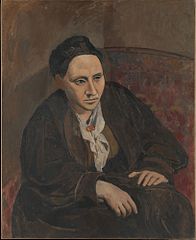I’ve been meaning to write this post ever since I went to a seminar on Stein’s idea of ‘syncopation’ in her essay ‘Plays’, and have decided to do it now, even if my memory of what happened is fast fading. Actually, the question of the temporality of response is one that fascinates Stein, so perhaps it’s for the better that I come to give my own response to her at a potentially problematic juncture.
Stein’s essay, for those who don’t know, is interesting in that it proposes the idea of ‘syncopation’ as a way of understanding the experience of a spectator at a play. Stein writes,
Your sensation as one in the audience in relation to the play played before you your sensation I say your emotion concerning that play is always either behind or ahead of the play at which you are looking and to which you are listening. So your emotion as a member of the audience is never going on at the same time as the action of the play.
I quote at length here to give you a sense of Stein’s own unique way of writing. In some respects this helps her argument, as it demands an unusual attentiveness from the reader. The key, and hard to miss, point here is that audience response is syncopated with respect to the performance, which is to say, “your emotion as a member of the audience is never going on at the same time as the action of the play”. Such a situation is what, according to Stein, “makes one endlessly troubled about a play”. For while excitement in real life occurs when “people … whom you know behave unexpectedly”, our limited knowledge of those characters we see on a stage prevents familiarity and so causes disquiet. Similarly, while real life provides the “completion of excitement”, the theatre simply allows “relief from excitement”. Behind all this is the larger idea that the stage is out of the audience’s control, so that they are always trying to catch up with it.
A second observation about syncopation is the question of whether the actor is as syncopated as the audience member. If the spectator is always trying to catch up, isn’t the actor (if they are not totally lost in the emotions of performance) always trying to prepare for the next line, the next move? Of course, this kind of syncopation, on the modern stage, can be extremely productive: ‘total theatre’ may try and drown out such syncopation on the part of the actors, while Brechtian performance will draw our attention to such tensions as part of its verfremdungseffekt.
I just imagine now the ideal version of a play (as far as such a thing is possible) as a line, a wave moving through time, and with the audience a little behind and the actors a little ahead. Yet the beat is and must be, I guess, always evident. I’ll leave you with that image.
